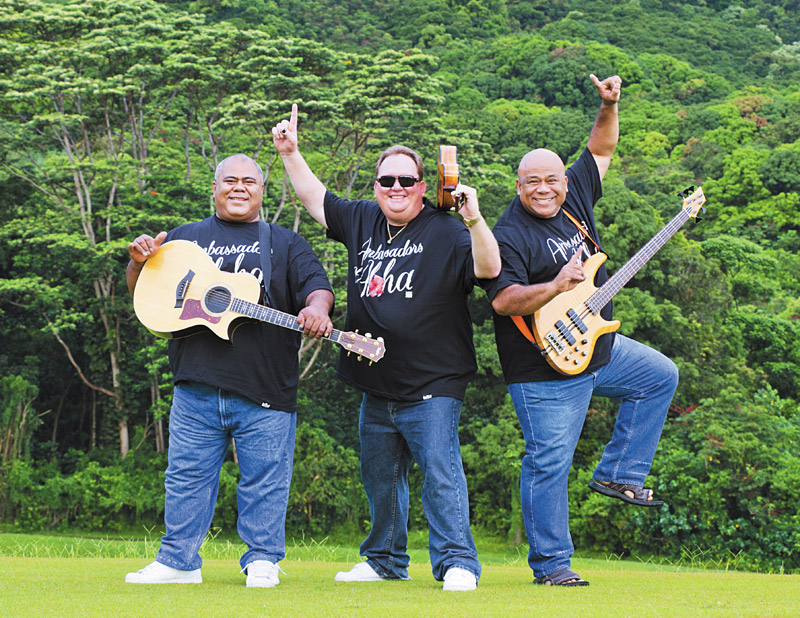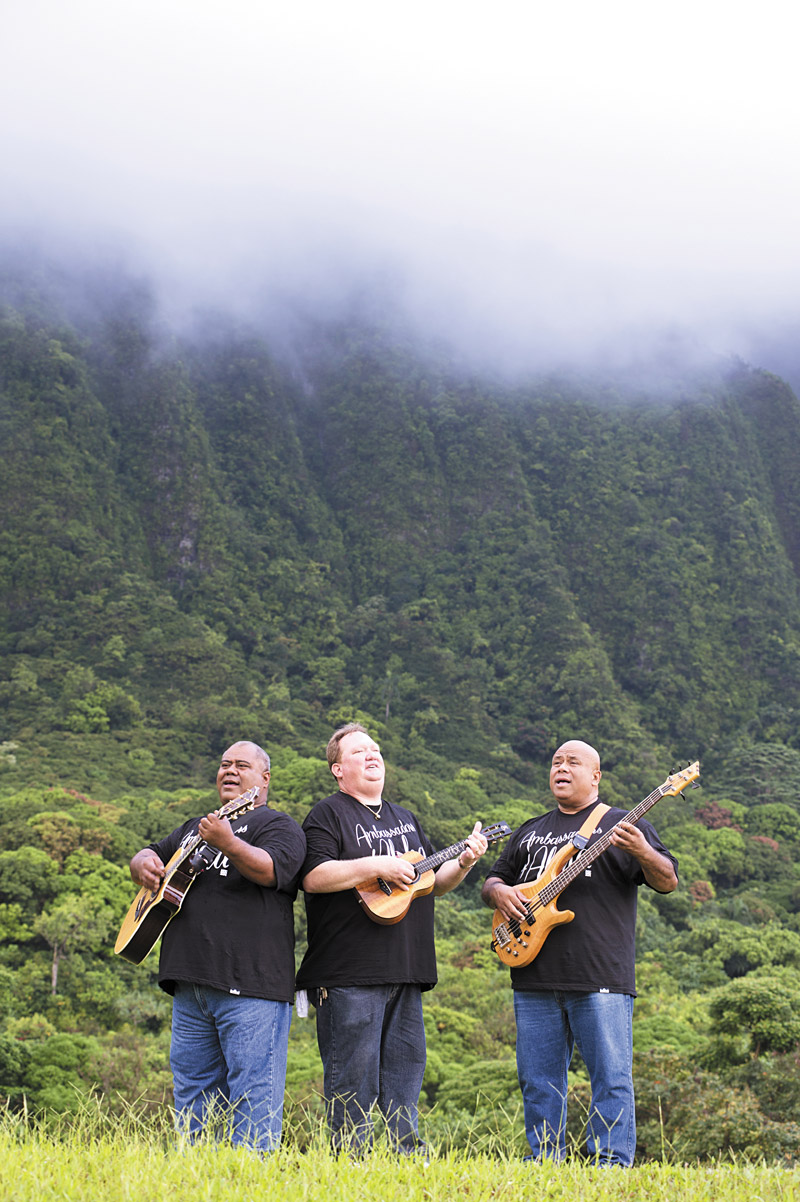Kapena Reunites For ‘One Last Hana Hou’
 Whatcha talkin’ ’bout — you say you don’t like the reggae beat? Then you must be one of the few music lovers not attending Kapena’s ‘One Last Hana Hou’ concert Sept. 26 at Waikiki Shell, where the legendary trio of Kelly Boy De Lima and brothers Timo and Tiva Tatofi will be performing for the fi nal time in Hawaii. And that makes you cray-ay-ay-ah-ha — cray-ay-zy!
Whatcha talkin’ ’bout — you say you don’t like the reggae beat? Then you must be one of the few music lovers not attending Kapena’s ‘One Last Hana Hou’ concert Sept. 26 at Waikiki Shell, where the legendary trio of Kelly Boy De Lima and brothers Timo and Tiva Tatofi will be performing for the fi nal time in Hawaii. And that makes you cray-ay-ay-ah-ha — cray-ay-zy!
One piece of gum, blindly tossed by a student over a railing, strikes another and nearly derails a musical legacy before it even has a chance of getting off the ground. Sure, that sounds crazy, but that’s how it all began for the feel-good, reggae-train riding outfit known as Kapena.
Here’s what happened: One day back in the early ’80s, a noted “gum”-slinger named Kelly Boy De Lima was descending a Kaimuki Intermediate School stairwell, when he decided to chuck his freshly chewed confection over the railing. The sticky wad wound up landing on the head of an unsuspecting student named Timo Tatofi and, needless to say, Tatofiwasn’t thrilled about what just nestled in his hair. And so with his blood in a boil and his hands in a clench, he stormed up the steps to confront the perpetrator. Now, neither of these eighth-graders knew the other at the time, but Tatofiwas ready to formally introduce his fists to De Lima’s fair-skinned and heavily freckled face — unless he received an immediate “sorry.”
In recalling the incident, De Lima confesses, “I didn’t do it on purpose. I just kind of threw the gum down over the railing, it hit him in the head and the sucka went ballistic! I mean, he wanted for scrap — just beat the crap out of me.”
Fortunately, an apology was issued and cooler heads prevailed that day, and that turned out to be a good thing for local music fans. Had punches been thrown, history might have been forever altered. Shudder to think what might have been if Kapena — a once-in-a-generation group made up of the otherworldly talents of De Lima, Tatofiand his older brother Tiva — had never existed.

But exist it did, thrilling fans with unmistakable melodies, unmatched three-part harmonies and unbelievable command of ukulele and guitars. And although the three-some hasn’t performed on stage together in more than a decade, that all changes
Saturday, Sept. 26, at Waikiki Shell, when these venerable musicians will reunite at the group’s “One Last Hana Hou” concert. The event, which begins at 5 p.m., also will feature well-known acts such as Fiji, Mana‘o Company, Bruddah Waltah and Tropical Knights.
But make no mistake about it — people are coming from far and wide to see Kapena’s original gang perform its magic together for the very last time in Hawaii.
“A lot of people say, ‘How come you never do this sooner?'” says De Lima, who is expected to hit the stage with the Tatofis around 8 that evening. “Well, it just wasn’t right. But it is now. This is the appointed and anointed time. Why? Because it feels good, it feels right.”
Indeed, next week’s concert is proof that good things continue to happen for Kapena and its legion of loyal fans. And to think it all started with the flight of a masticated gumball more than three decades ago. Or, as De Lima puts it, “If not for that (stick of gum), where would we be?”
More than anything, De Lima entered his sophomore year at Kaimuki High itching to get back to the high school talent showcase known as Brown Bags to Stardom, and win. His four-piece band Na Lei O Hawaii had qualified but lost the statewide competition the year before, and De Lima was looking for a bit of redemption. But, in the fall of 1985, he suddenly found himself trying to piece together a new group after the other members of Na Lei O Hawaii inexplicably called it quits.
Enter Timo Tatofi, who forgave De Lima for his gum-slinging mishap two years earlier and ended up befriending him. Still, the two had yet to really connect as fledgling musicians, until Tatofi approached De Lima one day and asked if the latter planned to enter Brown Bags again.
“Yeah.” “We go. You and me.” “Shoots.”
Soon after forming an alliance, the two invited Tiva to join the ranks of Kapena (“captain” in Hawaiian), a name suggested to them by De Lima’s father, Duffy, who always loved Kapena Falls. Unfortunately, the trio lost on its way to the 1985 Brown Bags to Stardom finals, but unlike what happened with Na Lei O Hawaii, these members decided to stick it out as a group.
“That moment could have broke a lot of kids, but we had so much good going for us,” says Tiva. “We knew we had something special.”

The original band members pose with their children during a recent gathering at Koolau Golf Club. Pictured are: (bottom row, from left) Lilo and Kalena De Lima (Kelly Boy’s daughters); (middle row) Dustin Park (Timo’s son), Josh Tatofi (Tiva’s son), Isaiah Pamatigan (son of Solo Pamatigan of Tropical Knight’s and godson of Kelly Boy) and Kapena De Lima (Kelly Boy’s son); (top row) and Timo Tatofi, Kelly Boy De Lima and Tiva Tatofi. PHOTO COURTESY OF KAPENA
Initially, Kapena thought of modeling its developing sound after one of the most revered Hawaiian music groups, Hui Ohana. But a subsequent meeting with falsetto master and friend of the family Dennis Pavao quickly convinced De Lima that the band had other gifts to offer the listening public.
Taking Pavao’s advice to heart, the band began experimenting with ideas beyond the traditional Hawaiian genre, and developed a complex sound that mixed Polynesian songs with pop music and danceable, reggae-infused rhythms. And almost immediately, Kapena turned into one of the hottest acts in town. Or, as De Lima says about the group’s earliest days playing the Honolulu club circuit, “With my ukulele playing, Timo holding rhythm on guitar and Tiva playing those mean bass lines, it was like fi-yah!”
At its incendiary peak, Kapena was an absolute juggernaut in the Islands, burning up radio airwaves with infectious tunes such as Watcha Talkin’ ‘Bout (Crazy), Baby Blue, Never Gonna
Give You Up, Blue Darling, Reggae Train, Nobody’s Child and Masese, and claiming two Na Hoku Hanohano Awards along the way with the release of its 1988 album Kapena And More.
“We were gigging all the time, and sometimes only getting eight hours’ sleep the entire week,” recalls Timo. “That’s how busy it was for us. There was no time to play around.”
“It’s the love of the music,” De Lima says. “We felt entrusted with this gift that God gave to us. Like, we’d show up at people’s weddings and the bride or groom would say, ‘We’re so happy to have you here on our special day.’ And we would just feel like we owed them something. In fact, we still feel like we owe something to the fans.”
Time waits for no one, and De Lima has never been one to sit back idly and watch it pass him by. To his credit, he’s continued to hoist the banner on the good ship Kapena, keeping the act relevant and constantly moving forward despite the absence of the Tatofis over the past 10 years. In the brothers’ places, he’s inserted his own musically talented children — son Kapena and daughters Kalena and Lilo — and even brought aboard other artists as backup musicians. And, in many ways, the current lineup hasn’t missed a beat, particularly in attracting a generation of younger listeners.
Still, people who remember the old days continue to talk about 2005, the year the original band members decided to stop performing and recording. And De Lima remains candid in his response when asked about what happened. “For the record, we never did break up. We just all had different responsibilities — I had my family, Tiva had a sick daughter to take care of at the time and commitments to his church, and Timo got married and moved back to Tonga,” he explains.
“Over the years, Tiva and I would still run into each other at parties and we’d always talk about eventually doing something. And although we would occasionally play songs together at family parties, the time wasn’t right to get together with Timo again.”
Until now. “You know, there hasn’t been a week that’s gone by where people haven’t come up to me and asked about Timo and Tiva. They’d say, ‘Whateva happened to da two braddahs?'” De Lima says. “Or they’d hit me up on Facebook and say, ‘Eh, we love your family and all, but we would pay good money to just see you guys perform together one more time.’
“Well, this is it.”






